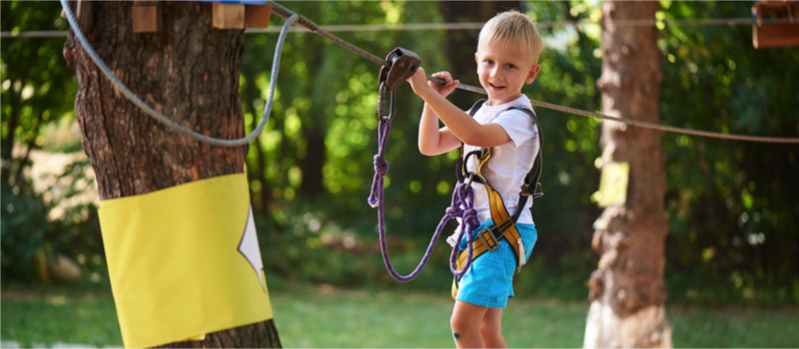
30 Jun Summer Camp Revisited

Margaret A.M. Heine
is the principal counsel at Heine Law Group in Fullerton, California. She is licensed in California and Washington and has authority to practice before the Supreme Court of the United States and the United States Court of International Trade.
Her practice includes estate planning, wills, trusts, and probate as well as business, real estate, and civil litigation. Email: nbylegas@gmail.com or visit company website www.margaretamheine.com.
Summer Camp Revisited
It is a rite of passage in some families that the kids get to go to summer camp and have fun and adventure to talk about all summer long. The American Camp Association has estimated that there may be more than 700 day camps in California that service more than 1.2 million children. Summer camps can range from day camp, sports camp, a resident camp, or a scout camp to name a few. What sets them apart from day care? They are basically unlicensed.
Unlicensed? Yes. Summer camps are typically only offered for a limited period of time, the summer, when school is generally not in session. The state does make distinctions as to whether or not any kind of licensing is required based on the length of the camp and whether or not the children spend the night.
In a resident camp, the children are spending the night, and some requirements may be having a nurse on staff, having staff receive CPR instruction, having the food meet a particular food guideline, and may actually set a staff/child ratio. The California Department of Social Services or the local county would typically regulate these types of camps.
Most resident camps are exempt from licensing because they are affiliated with a church, a state program, a school district, a college district or a recognized organization.
A sports camp is different. It is also usually a short duration, only held during daylight hours, and focuses on a particular sport or a variety of sports. These camps generally do not require licensing, but they are subject to California Health and Safety Code section 124235, Youth Sports Concussion Protocols. These protocols were set up for camps or competitions or training of persons under the age of 17 in basketball, baseball, boxing, motocross, diving, equestrian activities, field hockey, football, contact martial arts, gymnastics, cheerleading, hockey, rugby, skateboarding, soccer, softball, surfing, water polo and wrestling to name a few. This provision sets forth procedures in the event that a participant is injured while at sports camp.
It requires that coaches and administrators need to complete an in person or online concussion and head injury training session at least once, and it must be completed prior to being able to supervise the sports activity. A youth sports organization must provide to both the participant as well as the parents and the coaches information regarding concussions and head injuries at least once per year, and parents must sign and return the information sheet that they have read it and understood it.
The provision further requires that medical evaluation is necessary prior to the participant returning to the sport after being treated for at least 7 days.
AB1737 which was passed in May 2022, hopes to change the current law and provide more oversight and requirements for day camps and summer camps.
Assembly member Chris Holden introduced the legislation, and he believes that there should be some minimum requirements. First, the day camp would have to register with the appropriate State agency/department. Second, there would be background checks for all staff. Third, camps that have more “adventurous” activities, like riflery, archery, river rafting, would have to submit and have approved their operational and emergency plans in the event of an incident.
Organized camps or resident camps, would not fall into the new regulation as those camps are currently under the State Department of Public Health, which empowers the local county to oversee the camps. These camps are specifically, camps where children stay at camp for five nights or more, and basically live at the camp during the time they are enrolled.
There is still the administration nightmare of identifying what actually constitutes a day camp versus a child care program. It seems that the overwhelming factor is the length of time it is in business—most child care programs run 365/year year after year. Day camp is generally restricted to the weeks when school is not in session and run for a finite length of time and hours. Most day camps are also held outdoors, so are recreationally based, wherein child care is about preparation for school, for the benefit of the parents while they are working, and tend to focus on younger children who are able to do things independently. Whether these distinctions are enough to warrant a different treatment of child care programs from day camps still remains to be seen.
The only guidance that has given by the Department of Social Services is to explain that a group is exempt from licensing if the program is a “public and non-profit program designed to provide recreation on a part-time basis.”
In short, it is our duty as parents and caregivers of children to make inquiries into the programs our children are enrolled in. Ask questions that are important to you. Who is providing oversight, what will the children do at camp, what happens if your child is injured, what is the ratio of staff to children?
In the idyllic world vision of our children, summer camp is long awaited, anxiously participated in, and the perfect segway from one school year to another. Do we want to over regulate the industry? What should be the base requirements for the industry? Is having a say as to whether or not our children attend a camp enough to ensure that only good camps survive?
I am hoping for continued summer wonder and fun, with just a touch of caution thrown in.




Sorry, the comment form is closed at this time.